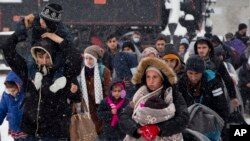Greek Prime Minister Alexis Tsipras urged European Union countries to honor the bloc's decisions on sharing the burden of the migrant crisis, saying that if they did not, Athens would block future agreements.
Austria, defying criticism from Greek and U.N. refugee officials, took further steps on Wednesday to coordinate border restrictions spanning the Balkans that are intensifying a logjam of migrants in Greece.
"We will not accept turning the country into a permanent warehouse of souls with Europe continuing to function as if nothing is happening," Tsipras told parliament Wednesday.
"Greece will not agree to deals [in the EU] if a mandatory allocation of burdens and responsibilities among member countries is not secured," he said.
Athens has protested against restrictions imposed by countries further north along the main land corridor into Europe, including along Austria's frontier with Slovenia and Macedonia's border with Greece.
Defying criticism from Greek and U.N. refugee officials, Austria on Wednesday took further steps to coordinate a slew of border restrictions spanning the Balkans that have caused a worsening logjam of migrants in Greece.
"We will not tolerate that a number of countries will be building fences and walls at the borders without accepting even a single refugee," Tsipras said. "Greece will demand the mandatory participation of EU countries in the relocation of refugees."
Unacceptable burden
He said it was unacceptable for EU partners to dump the burden of the crisis on Greece, forcing it to shoulder a weight way disproportionate to its size.
"We did and will continue to do everything we can to provide warmth, essential help and security to uprooted, hounded people," he said. "We will either be in a union of common rules for all or everyone will do they please: we will not accept the latter."
Addressing worries that flow restrictions at the northern border could swell the number of migrants stranded in Greece, Tsipras said he would meet political party leaders to form a common stance before an early March summit of EU leaders on the migration crisis.
Earlier on Wednesday, he told German Chancellor Angela Merkel he was deeply displeased about the failure of some EU leaders to stick to bloc decisions on tackling the refugee crisis.
The two leaders agreed to intensify efforts to implement EU decisions and start NATO operations in the Aegean Sea immediately to counter smuggling networks to reduce migrant inflows.





